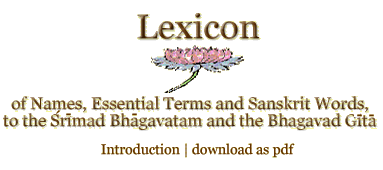
A|B|C|D|E|F|G|H|I|J|K|L|M|N|O|P|Q|R|S|T|U|V|W|X|Y|Z
I
Īs'āvāsya (of īs'a: the Lord, and vāsya:rule): the principle that prescribes that everything must be engaged in the service of the Lord, the Supreme Enjoyer and Absolute Master, because everything belongs to Him.
Īs'vara: a ruler, a controller. Krishna is Parames'vara, the supreme governor (see Yogis'vara).
- Independence, also the Lord (e.g. the Lord of Yoga: Yogis'vara).
- He who controls himself and thereby the whole world (see also Hiranyakas'ipu).
Īs'a: the name of the Almighty Lord in heaven (īs'ā means pole, plank, board or particular measure and īsha is the month ās'vina and a person's name).
Īsopanishad: a certain philosophical treatise about the wholeness of God. See Upanishads
Īs'varapranidhāna: from self-knowledge to God-consciousness. Another term for devotional service (see bhāgavata dharma and niyama).
Ignorance: (tamo-guna) slowness, darkness. One of the three modes of nature. He who finds himself under her influence falls into bewilderment and confusion, laziness and the use of sedating and intoxicating drugs. This mode is ruled by Lord S'iva (see also avidyā).
Ikshvāku: a son of Manu, who in the past received the knowledge of the Bhagavad Gītā (see S.B. 9.6: 4). Also known under the name of his dynasty, in which Lord Rāma appeared.
Ilā: ('the libation') was born as a daughter to Manu S'rāddhadeva who wanted a son. By prayers of Vasishthha there wasaturn to manhood so that king Sudyumna was born who turned into a woman again gettying to close to Lord S'iva (see 9.1. 16-27).
Ilāvrita-varsha: the central region, the place where Lord S'iva meditates. Also known as mountain Meru, the central area which as a seed or golden egg constitutes the nucleus of the galaxy or of all worlds (see also varsha and dvīpa and S.B.: 5.16: 7 en 5.17:15-16).
Impersonalist: someone who knows the Absolute Truth only to its energies and because of this only realizes its impersonal aspect.
- Another name for a Mayavadi.
- Someone subscribing to monism.
Indra: the king of the heavenly planets; the king of heaven. He killed the demon Vritra.
Indraloka: the planet where Lord Indra has his seat.
Indraprastha: ('Indra's place', now Delhi) city where the Pāndavas resided and where Krishna arrived for the great rājasūya sacrifice that declared Him the Supreme Personality and from where Duryodhana left angry being laughed at for his ignorance of falling into water he took for a solid floor (see: S.B. 10.75).
- The city, built by Vis'vakarma, was visited by Krishna once, the center of events that lead to the burning of the Khāndava forest and the resultant donation of Arjuna's weapons, chariot and horses by Agni (see S.B. 10.58: 24-29).
Indriya: the senses, karmendriyas en jnanendriyas: the working and knowing senses. The ten senses are the organs of the hearing, touching, seeing, tasting and smelling, (for perception) with the mouth, the hands, the legs, the genitals and the excretion organs as the tenth (for acting). Sometimes the mind is added as the eleventh sense (S.B. 3.26: 13 and see also vishaya).
- Physical or material intelligence: the power to assess data received in the mind and so be able to analyze as well the greater of nature as the functioning of the material energy.
- Spiritual intelligence (buddhi): the original intelligence of the living being, of which it is capable to comprehend how everything (including the involved living being itself) relates to God, the Supreme Person. By this intelligence we rid us of our materialistic philosophies of life.
- Wife of Lord S'iva.
- Wife of Parīkchit, daughter of King Uttara, who begot four sons with him, with Janamejaya as the first (1.16: 2).
ISKCON: international Society for Krishna-consciousness: name of the in1966 by Swamī Prabhupāda founded international society for Krishna -consciousness, also called the Hare Krishna-movement (see also math).
Itihāsas: histories e.g. dealing with the rise and fall of dynasties and their missions with God and such, like the Mahābhārata and Ramāyana.
A|B|C|D|E|F|G|H|I|J|K|L|M|N|O|P|Q|R|S|T|U|V|W|X|Y|Z
J
Jada Bharata: Bharata Mahārāja in his last life (see S.B. 5:9-13).
Jagāi and Mādhāi: two big womanizers and drunkards who by Lord Nityānanda were converted to vaishnavism (story from the Caitanya-caritāmrita).
Jagat: universe also meaning the living being. The Lord is often described as jagatpati, jagadīs'vara or Jagannātha, the Lord of the Living Being that is the Universe (see also purusha, and virāth rūpa).
Jagganātha: Krishna as the Lord of the Universe, His mūrti is worshiped together with the one of His sister Subhadrā (married with Arjuna) and His brother Balarāma and in procession taken around the city with ratha-yātrā.
Jalpa: (chatter): the ten different types of strange talk or citra-jalpa that the gopīs in divine madness (divyonmāda) have missing the outer form of Krishna: prajalpa (denigrating), parijalpa (exposing), vijalpa (sarcasm), ujjalpa (spite), sańjalpa (decrying), avajalpa (belittleling), abhijalpa (plaintive remorse), ājalpa (disgust), pratijalpa (self-depreciating hope) and sujalpa (concern) (see S.B. 10.47: 12-21). With this they modelled meritoriously the emotional, irrational tie a devotee can have being separated from Krishna (see also rasa).
Jamadagni: one of the seven sages of this manvantara (see rishi and S.B. 8.13: 5).
- The sage who led the recitations of the Yayur-veda mantras at the sacrifice of Haris'candra, who for the sake of begettingason had to sacrifice his son Rohita to Varuna (see S.B. 9.7: 9).
- The son of Satyavatī, the daughter of Gādhi from the line of Pūrurāva in the Kus'a-dynasty, who by sage Ricīka was cursed to be a harsh personality but was excused so that his son would be so and thus was from him married to Renukā, the avatāra Paras'urāma born (S.B. 9.15: 5-13).
- He was killed by the sons of Kārtavīryārjuna (see S.B. 9:15: 17) grieving over the losses caused by Paras'urāma and was resuscitated by Him, and thus became he, because of the worship of Him, with his body restored with all the symptoms of life, knowledge and remembrance, the seventh star in the constellation of seven, one of the great seers (S.B. 9.16: 24).
Jāmbavān: 'he from the Jambu-trees', the monkey chief, also called the chief or king of the bears. He contested with Krishna for the syamantaka jewel, was defeated and handed his daughter Jāmbavatī over for Krishna to marry (see S.B. 10.56). A known character also mentioned in connection to Rāma in S.B. 8.21: 8 and in S.B. 9.10: 42-43.
Janaka: ruler of the kingdom of Mithila, a great selfrealized sovereign; the father in law of Lord Rāmacandra. Father of Janakī or Sītā (a character from the Ramāyana).
Janaloka: 'the world of men'; the 5th Loka or next above Mahar-loka, residence of the sons of Brahmā and other godly men (M.W.).
Janamejaya: the son of emperor Parīkchit who offered all snakes in the fire reacting on Takshaka who had killed his father (S.B. 12.6: 16).
Janārdana: 'he who incites, drives, stirs to action'. Vishnu or Krishna as the maintainer of all living beings and the three worlds. He as the well-wisher.
Janmāshthamī: Krishna's birth of 3182 years B.C. according many authorities is called Janmāshthamī and occurred on the eight day of the dark half of the month of Bhādra or S'rāvana, August-September, see also S.B. 10.3).
Japa: mantra-meditation; praying the Vedic way: repeating the holy name with the māhāmantra and the Pańca-tattva-mantra with the help of a Japa-mālā (vedic rosary, also see page and the gāyatrī).
Japa-mālā: string of prayer beads 108 in number plus one, on which every day 16 x 108 times the māhāmantra is chanted (monotonous singing) by the devotees of ISKCON. Material: Tulsi and Nim.
Jarā: 'old age': name of the hunter who pierced Krishna's foot at Prabhāsa (see S.B. 11.30). Also mentioned in S.B. 4: 27: 19 and as the mother of Jarāsandha in S.B. 9.22: 8.
Jarāsandha: the son of Jarā, uncle of Krishna and brother of Kamsa who with twenty-three armies was defeated seventeen times by Krishna who used him to assemble His enemies to defeat them before He withdrew in Dvārakā (see S.B. 10: 50). Rukmī and S'is'upāla were his allies.
Jatāyu: eagle with the sharpest eyes who reported to Lord Rāmacandra the kidnapping of mother Sītā and was killed by Rāvana as he tried to stop him in his scheme.
Jaya: all honor to, exclamation of joy and consent (pronounced: dzjéją).
Jaya and Vijaya: the two gatekeepers of Vaikunthha who were cursed because of having committed an offense towards the four Kumāra Rishis, and therefore were condemned to be reborn three times in the material world as the great demons Hiranyakas'ipu and Hiranyāksha, Rāvana and Kumbhakarna and S'is'upāla and Dantavakra (see S.B. 7.1: 36-47).
Jayadeva Gosvāmī: a great Vaishnava poet and author of the Gītā-govinda.
Jīva Gosvāmī: one of the six great wise or Gosvāmīs of Vrindāvana that succeeded S'rī Caitanya Mahāprabhu and systematically described His teachings.
Jīva or jiv-ātmā: the individual soul (see also anu-ātmā and sankarshan).
Jīva-s'akti: the intermediate - energy of the Lord: the complete of the living beings (see also yoga-māyā, māyā and s'akti).
Jīva-tattva: the category of living beings (see ātmā) who are the utterly small but complete parts of the Supreme Personality. As opposed to vishnu-tattva.
Jivātmā: the individual atomic soul, as opposed to paramātma , the Supersoul (see ātmā).
Jńāna (literally: knowledge): religious, spiritual knowledge or knowledge of which one is capable to discriminate between the physical encasement and the spiritual soul.
- Search of truth at a philosophical level.
- As a negative term: only theoretical knowledge.
- The epistemology, the description of the grounds, the method, the theory of spiritual knowledge is, as described in S.B. 11.28: 18, refering to the timefactor, the ultimate cause (see also kāla and brahman).
- Spiritual knowledge is based on four principles: sankhya (analysis), tapas (austerity, penance), vairaghya (detachment) and yoga (see also vidyā and Kumāras).
Jńāna-kānda: department of the Vedas that deals with the philosophical investigation of truth.
Jńāna-yoga: yoga of the knowledge, yoga-philosophy. To unite oneself in consciousness with the knowledge of self-realization.
- The way of knowledge. Who follows this path (the jńānī) tries to attain spiritual perfection by developing knowledge specializing in the study of the scriptures and philosophic reflection. One can thus realize the impersonal Brahman.
Jńānendriyas: the senses of perception: the touch, the sight, the taste, the hearing and the smell (see indriyas).
Jńānī (jńāna-yogī): someone after the development of knowledge (especially by means of speculative thinking). Arriving at perfection, he is of surrender to Krishna. Non-preaching, 'value-free'.
- Someone who has spiritual knowledge (see jńāna).
- Spiritualist of the third plan (see yogī), expert in jńāna-yoga.
- As a negative qualification: someone developing knowledge through speculation.
Search the Lexicon

